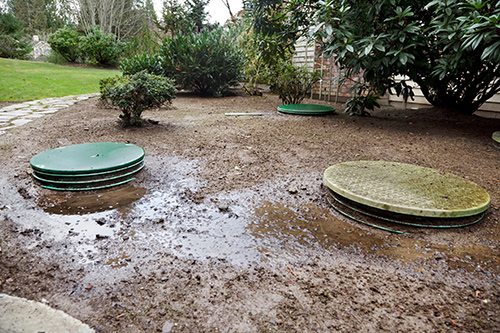
Q: How can you tell if land is too wet for a septic system? Can an area be covered with a tarp during the wet season to help it pass the perc test?
A: Wet sites are challenging for septic system design and for home building in general. If the seasonal high water table is too close to the surface – less than three feet below the gravel trenches in the drain field – then most jurisdictions will not allow a conventional septic system. They are concerned about inadequate treatment of the sewage and possible contamination of groundwater.
If the depth of the groundwater is not an issue, but the soil is saturated from spring conditions such as rain and snowmelt, then you should still pass the perc test as long as the soil is sufficiently porous. Many towns require that the test be done in the wetter seasons in order to test under worst-case conditions. Also, test procedures typically require soaking the hold overnight to saturate the soil. The slower absorption is factored into the test.
Undisturbed Soil
Tarping the soil to keep it drier might improve the test results, but most agencies that regulate septic systems would consider this a form of soil modification and would not permit it. You would need to contact your local health department for an authoritative answer.
In general, septic system regulations require that perc tests be performed on “undisturbed” soil that has not been filled, graded, treated, replaced, or otherwise modified in any way that would alter its drainage characteristics.
A better approach would be to test the soil at the driest time of the year that is acceptable to the local authorities – certainly not after a week of rain. Drier weather would tend to increase the absorption rate of the soil, but will not change the location of the seasonal high water table, which is usually determined by visual inspection of the soil during the “deep hole” test.
One thing to keep in mind is that a site tested only in the dry season – and without proper saturation of the test hole – may result in a fair-weather septic system. The drain field may not function properly during the wettest parts of the year. You want a septic system with ample capacity year-round and for years into the future. Any effort to “cheat” the perc test could backfire on you in a most unpleasant and expensive fashion.
For more information, contact Morse Engineering and Construction.
Source: buildingadvisor
